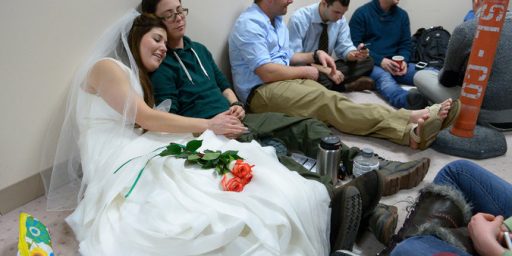California Legislature Passes Gay Marriage Bill
California’s assembly has passed the nation’s first gay marriage law but it faces a veto by Governor Arnold Schwarzenegger.
California Lawmakers Pass Gay Marriage Bill (AP)
Gay rights supporters cheered loudly from the gallery as California lawmakers became the first in the country to approve a bill allowing same-sex marriages. But their celebration may be short-lived. The legislation could be vetoed by Gov. Arnold Schwarzenegger, who has expressed an acceptance of gay marriages but said it’s an issue that should be decided by voters or the courts. “He will uphold whatever the court decides,” spokeswoman Margita Thompson said Tuesday after the state Assembly approved the same-sex marriage measure, 41-35. The Senate had approved it last week.
A state appellate court is considering appeals of a lower court ruling that overturned California laws banning recognition of gay marriages. And opponents of same-sex marriage are trying to qualify initiatives for the 2006 ballot that would amend the state Constitution to ban gay marriages.
The bill’s supporters compared the legislation to earlier civil rights campaigns, including efforts to eradicate slavery and give women the right to vote. “Do what we know is in our hearts,” said the bill’s sponsor, San Francisco Democrat Mark Leno. “Make sure all California families will have the same protection under the law.”
But opponents repeatedly cited the public’s vote five years ago to approve Proposition 22, which prohibits California from recognizing same-sex marriages performed in other states or countries. “History will record that you betrayed your constituents and their moral and ethical values,” Republican Assemblyman Jay La Suer said.
Schwarzenegger’s position here would seem quite bizarre, turning Republican orthodoxy on its head. Why would such a fundamental public policy decision be the role of the courts rather than those elected to make public policy?
Presumably, he’s simply arguing that the law is unconstitutional because of Proposition 22. This measure passed overwhelmingly in 2000, adding “Only marriage between a man and a woman is valid or recognized in California” to the books. Technically, it did not ban gay marriage because it was already banned: “Marriage is a personal relation arising out of a civil contract between a man and a woman.” Prop 22 was aimed at ensuring that homosexual marriages performed in other states would not be recognized.
However, both these provisions are merely part of the Family Code rather than the state Constitution. As Vikram Amar notes, this is a rather subtle distinction in this case because state referendums can not be overturned by the legislature. Indeed, the process for passing a Proposition that amends the constitution and one that doesn’t is virtually identical. Still, if a simple statute would be held to violate the Equal Protection clause, it’s doubtful that a statewide referendum would.
Of course, Prop 22 could be put on the ballot again in the form of a constitutional amendment which, if passed, would by definition be perfectly constitutional.






So, is Governor Schwarzenegger saying that no law passed by the California legislature is a valid law because it was not put to a popular vote by the people?
Prop 22, it seems to me is the crux of the situation, here… along with, of course the majority is represents. Are we really so much in objection to the will of the majority?
James: I think you’re approaching this backward from the reality and that’s causing your confusion, as if Schwarzenegger was starting from a view of Californian law and arriving at a decision to veto the bill. The reverse is far more likely. He’s developed national ambitions within a Republican Party where opposition to gay marriage has become a litmus test issue, and must therefore veto the bill. From the decision, he then needs to arrive at – not a reason, but an explanation. Or “excuse” if you will.
I thought going to the courthouse was what the “liberal elites” did because they couldn’t get what they wanted passed by legislatures.
This is pretty surprising, though, in light of the proposition passed in 2000. These legilators obviously feel they can win reelection even after voting to approve this measure. James Dobson must be about to have a coronary episode.